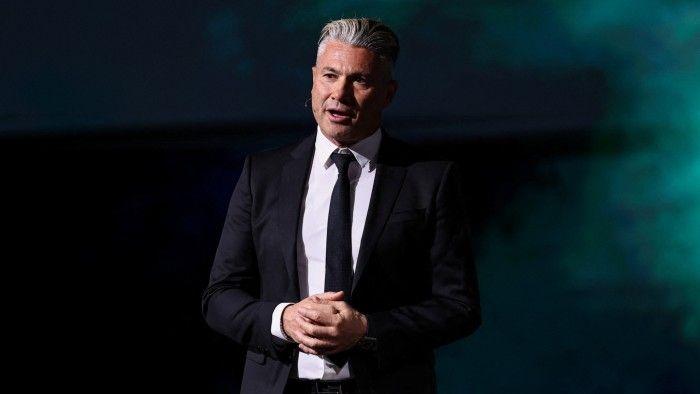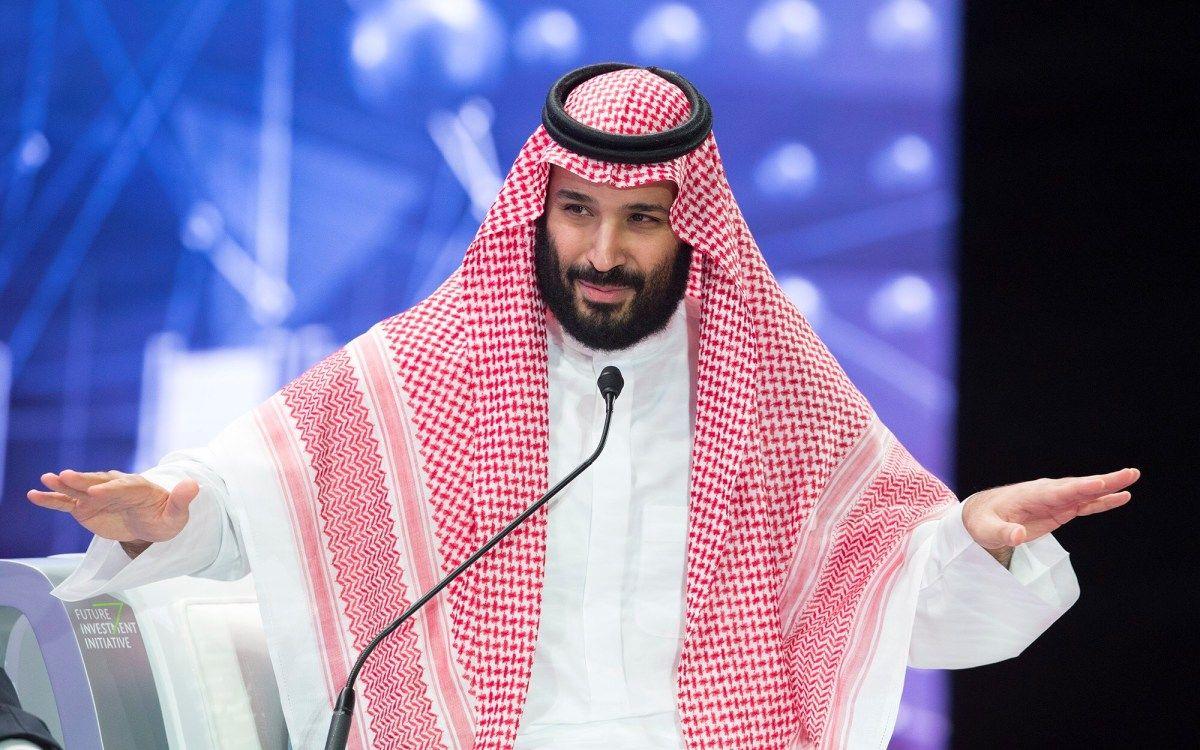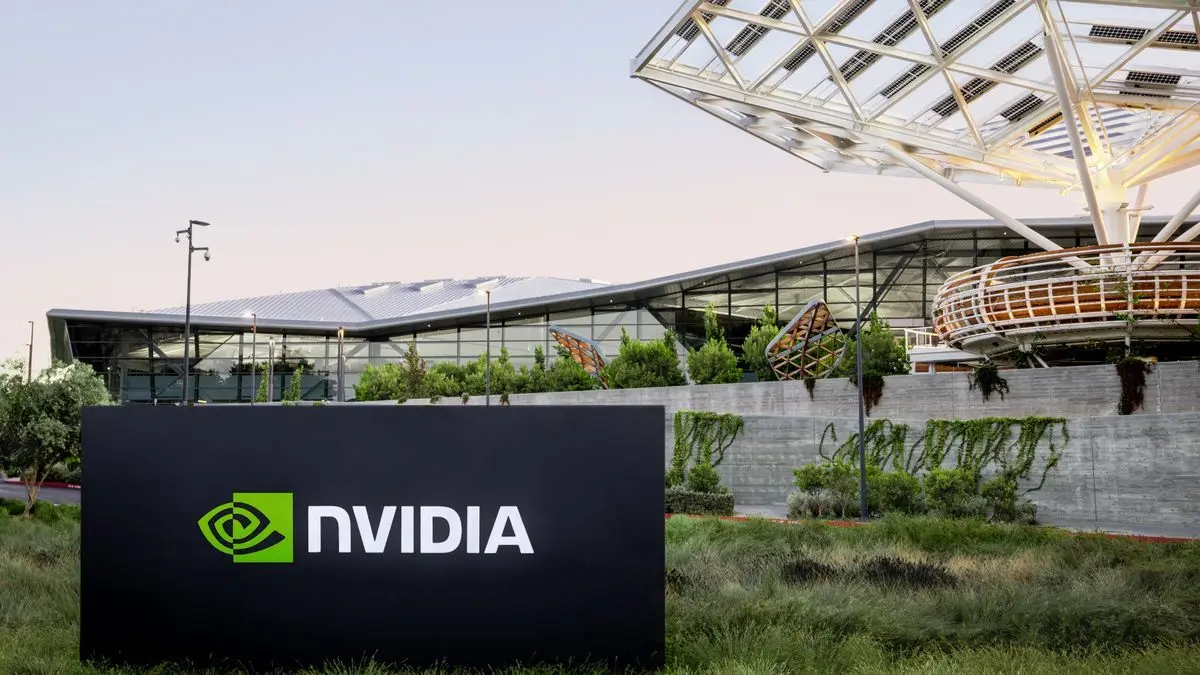Saudi Arabia's Humain Unveils $10 Billion VC Fund and Ambitious AI Infrastructure Plans
3 Sources
3 Sources
[1]
Humain planning $10B VC fund to invest in US, European and Asian startups | TechCrunch
Humain, the state-owned AI company from Saudi Arabia, is on track to launch a $10 billion venture fund, Humain Ventures, that will invest in startups in the U.S., Europe and Asia, The Financial Times reported, quoting Tareq Amin, Humain's CEO. Humain is in talks with U.S. firms like Andreessen Horowitz, OpenAI and Elon Musk's xAI about its plans, and is also exploring a deal with U.S. companies to sell an equity stake in its data center business, the report said. Amin did not reveal which these companies are, but said some are "massive names in the data center segment," according to the report. Humain was launched earlier this month ahead of a visit by U.S. President Donald Trump and several tech industry allies. Under a new Trump administration initiative, U.S. tech suppliers, including Nvidia and AMD, have been allowed to arrange deals with Saudi Arabian firms. So far, Humain has struck deals with Qualcomm, Nvidia, AMD and Amazon, and plans to have 1.9 gigawatts of data center capacity by 2030. The plan is to process 7% of global AI training and inferencing by 2030, and the endeavor is expected to cost about $77 billion, the FT quoted Amin as saying.
[2]
Saudi AI company courts US tech investors and plans $10bn venture fund
Saudi Arabia's new state-owned artificial intelligence company will seek investment from top US tech companies and will launch a $10bn venture capital fund as it leads the kingdom's effort to become a global AI hub. Tareq Amin, chief executive of Humain, told the Financial Times he was in talks with American groups including OpenAI, Elon Musk's xAI and Andreessen Horowitz about its ambitious plans. He said it was seeking a US tech group to become an equity partner in Humain's data centre business, which aims to become one of the world's biggest AI infrastructure providers, but declined to say which American companies were interested in such a deal. "We are in discussions with all of them," Amin said in his first interview since Humain's launch this month. "Some of them, which you will hear about very soon, are massive names in the data centre segment." The 52-year-old said its VC fund, Humain Ventures, would launch this summer with an initial $10bn to spend in start-ups in the US, Europe and parts of Asia. Humain is seeking to use Saudi Arabia's financial might to gain a central role in almost every aspect of the burgeoning AI industry -- from investing, infrastructure and chip design. That sprawling strategy is unmatched outside a handful of US and Chinese Big Tech companies, which have had years, if not decades, to build their businesses and technical expertise. US tech firms increasingly view Gulf states and their powerful sovereign wealth funds as critical sources of investment, with American tech executives in talks with regional officials about investments and raising capital. Humain, which is owned and funded by the $940bn Public Investment Fund, was unveiled the day before US President Donald Trump visited Riyadh, with a host of top tech executives in tow, including Musk, OpenAI's Sam Altman and Nvidia's chief executive Jensen Huang. Saudi Crown Prince Mohammed bin Salman, the kingdom's de facto leader, chairs Humain and has tasked it with driving Riyadh's multibillion-dollar ambitions. The AI company had already inked deals worth $23bn with US tech groups, including Nvidia, AMD, Amazon Web Services and Qualcomm since its launch, said Amin. Humain has a target of establishing 1.9 gigawatt of data centre capacity by 2030, rising to 6.6GW four years later -- which would be among the largest global AI infrastructure projects. Amin said that, at current market rates, the project would cost $77bn. The chief executive said Humain's goal is, by 2030, to be processing 7 per cent of global "training", the development of AI models and "inferencing", the model's responses to user requests. "The world is hungry for capacity," said Amin, a Jordanian-American who was previously chief executive of Aramco Digital, the tech arm of the Saudi state oil company. "There are two paths you could take: you take it slow and we are definitely not taking it slow, or you go fast. "Whoever reaches the end line first, I think, is going to secure a good chunk of the market share." The establishment of Humain underscores Prince Mohammed's ambitions in the sector as energy rich Gulf states vie to be regional AI leaders, use technology to hasten the diversification of oil-dependent economies and become "data exporters". Like the neighbouring United Arab Emirates, Saudi Arabia has decided to focus on working with American tech groups as it seeks to reassure US policymakers concerned about technology transfer to China, the region's biggest trading partner. Amin said Humain understands that its "equity partners bring more than just capital". "The importance of the US ecosystem is very critical," he added. "If you go and look at our suppliers, you'll discover that we were deliberate on the partnerships and the choices that we have picked . . . we did not want to make mistakes." The first phase of its plan to build huge data centre parks will begin with a 50MW plant utilising 18,000 Nvidia chips it hopes to bring online next year, with a plan to expand that to 500MW in phases, which would require about 180,000 chips, Amin said. Musk's "Colossus" AI cluster for xAI was built utilising 100,000 Nvidia GPUs. Meanwhile, the first US "Stargate" data centre being funded by OpenAI, Japan's SoftBank and Oracle is expected to have 400,000 Nvidia's GB200 chips -- the latest "Superchip" for training and running AI systems. Humain has also signed a $10bn joint venture with AMD to supply 500MW of capacity over five years, and is investing $2bn with Qualcomm to develop data centres and chip design capabilities in the kingdom. Under the latter deal, Qualcomm will set up a chipset design centre in Riyadh that employs 500 engineers. Humain has no plans to move into chip manufacturing, however. Amin said Humain would begin the procurement process for the chips from the US tech firms in the next 30 days, adding that he was optimistic that the sales would be supported by the Trump administration. In recent weeks, Washington announced it was scrapping a Biden-era rule that limited the sale of AI chips to countries like Saudi Arabia, but added it would introduce a different rule as a replacement. Addressing concerns about privacy and security at data centres, Amin said Humain would allow "real-time inventory" or allowing customers to instantly audit how information was being used and processed. In addition, Riyadh was expected to pass legislation that would, in effect, mean data centres would be regulated under the laws of the country of origin of the tenant AI company, he said. It is unclear if this will satisfy strict "data sovereignty" rules, such as in the EU, which prevent the holding of sensitive information in overseas servers. To lure data centres to the kingdom, Riyadh is offering subsidies on electricity prices, which are already among the lowest in the world. Humain would provide the infrastructure for joint ventures. It is a model that has been applied for Groq, which has been building what it describes as the world's largest inferencing data centre in the kingdom. It began as a joint venture with Aramco Digital, overseen by Amin, but will probably move to Humain as Riyadh looks to consolidate its prime AI assets within the new entity. In February, Riyadh agreed to a $1.5bn expansion of the project in the country's Eastern Province, where Humain has secured a lease for 2.3 square miles of land at an industrial city. The site could host 10 200MW plants, Amin said, adding that Humain planned to develop a park three times the size in Riyadh. The plans come at a time when the government and the PIF are grappling with lower oil prices and the vast scale of their financial commitments with multiple megaprojects under way. But AI is considered one of the areas where the kingdom will look to prioritise. Asked whether a period of lower oil prices would impact Humain's spending plans, Amin said: "The question we should ask: can you afford as a country to miss the opportunity?" Additional reporting by Michael Acton and Cristina Criddle in San Francisco
[3]
Saudi Arabia Unveils $10 Billion VC Fund in Race for Middle East's AI Crown | PYMNTS.com
By 2030, Humain aims to process 7% of global AI workloads, with plans for 6.6GW of data center capacity and chip design capabilities through deals with AMD and Qualcomm. Saudi Arabia's new state-backed AI company plans to launch a $10 billion venture capital fund and seek investments from top U.S. tech companies as it strives to become the AI leader in the Middle East. According to a Financial Times report, Humain wants to become a major player in artificial intelligence (AI) infrastructure, investment and chip design -- areas typically dominated by long-established U.S. and Chinese tech giants. The cornerstone of its investment strategy is the new venture fund, Humain Ventures, which will target startups across the U.S., Europe, and parts of Asia beginning this summer. Humain, which debuted earlier this month, also plans to build out 1.9 gigawatts of data center capacity by 2030, expanding to 6.6GW by 2034 -- one of the largest planned AI infrastructure builds globally. At current market rates, this would require a $77 billion investment, CEO Tareq Amin said. Amin said Humain is seeking a U.S. equity partner for its data center business. It is in talks with OpenAI, Elon Musk's xAI, and venture capital giant Andreessen Horowitz. "We are in discussions with all of them," Amin told the FT. "Some of them, which you will hear about very soon, are massive names in the data center segment." See also: Bahrain's AI Push in Middle East Could Serve as Model for Region, Experts Say By 2030, Humain aims to handle 7% of the world's AI training and inferencing workloads. "The world is hungry for capacity," said Amin. "There are two paths you could take: you take it slow and we are definitely not taking it slow, or you go fast. Whoever reaches the end line first, I think, is going to secure a good chunk of the market share." Humain's strategy has already yielded $23 billion worth of deals with U.S. tech firms, including Nvidia, AMD, Amazon Web Services and Qualcomm, according to Amin. Bloomberg reported earlier that Humain and Amazon are investing upwards of $5 billion on an AI zone in Saudi Arabia. It will use tech from Amazon Web Services to develop a marketplace of AI agents for use by the Saudi government. Read more: Nvidia and Amazon Land Middle Eastern AI Deals Amid Trump Visit Humain is chaired by Crown Prince Mohammed bin Salman, who has made AI a centerpiece of his plan to diversify the kingdom's economy away from oil. Like neighboring UAE, Saudi Arabia has focused on working closely with U.S. tech companies in an effort to reassure Washington amid concerns over China's growing influence. "The importance of the U.S. ecosystem is very critical," Amin said. "If you go and look at our suppliers, you'll discover that we were deliberate on the partnerships and the choices that we have picked ... we did not want to make mistakes." Initial plans include a 50MW data center using 18,000 Nvidia GPUs, with expansion to 500MW requiring approximately 180,000 chips. This places Humain's ambitions in the same league as Musk's xAI, whose Colossus cluster uses 100,000 Nvidia GPUs, and the "Stargate" data center being built by OpenAI, SoftBank and Oracle, which will feature 400,000 Nvidia GB200 chips. Read more: This Week in AI: Trump Repeals Biden AI Rules but Launches Stargate Humain has also partnered with AMD on a $10 billion joint venture to provide 500MW of capacity over five years. It is investing $2 billion with Qualcomm to co-develop chip design and data center capabilities. Under the deal, Qualcomm will establish a chip design center in Riyadh employing 500 engineers, although Humain has no plans to enter chip manufacturing. Within 30 days, Humain will begin the procurement process for chips from U.S. companies. Amin said he is hopeful that the sales will be supported by the Trump administration, which recently moved to reverse Biden-era restrictions on advanced chip exports to Saudi Arabia. To attract more data centers, Saudi Arabia is offering subsidized electricity -- already among the cheapest in the world.
Share
Share
Copy Link
Humain, Saudi Arabia's state-owned AI company, announces plans for a $10 billion venture fund and massive AI infrastructure investments, aiming to process 7% of global AI workloads by 2030.
Saudi Arabia's Bold Entry into the Global AI Race
Saudi Arabia has made a significant move in the global artificial intelligence (AI) landscape with the launch of Humain, a state-owned AI company backed by the kingdom's $940 billion Public Investment Fund. Chaired by Crown Prince Mohammed bin Salman, Humain is set to spearhead Saudi Arabia's ambitious plans to become a global AI hub
1
.$10 Billion Venture Fund and Strategic Investments

Source: FT
At the heart of Humain's strategy is the planned launch of a $10 billion venture capital fund, Humain Ventures, slated to begin operations this summer. The fund will focus on investing in startups across the United States, Europe, and parts of Asia, signaling Saudi Arabia's intent to become a major player in the global AI ecosystem
2
.Massive AI Infrastructure Plans
Humain has set forth an ambitious plan to build out substantial AI infrastructure. The company aims to establish 1.9 gigawatts of data center capacity by 2030, with plans to expand to 6.6 gigawatts by 2034. This initiative, estimated to cost around $77 billion at current market rates, positions Saudi Arabia to potentially become one of the world's largest AI infrastructure providers
3
.Partnerships with US Tech Giants

Source: PYMNTS
Humain has already inked deals worth $23 billion with prominent US tech companies, including Nvidia, AMD, Amazon Web Services, and Qualcomm. These partnerships are crucial to Humain's strategy of rapidly building AI capabilities and infrastructure
1
.Key collaborations include:
- A $10 billion joint venture with AMD to supply 500MW of capacity over five years
- A $2 billion investment with Qualcomm to develop data centers and chip design capabilities in Saudi Arabia
- Plans to build a 50MW data center using 18,000 Nvidia GPUs, with potential expansion to 500MW requiring approximately 180,000 chips
2
Ambitious Goals and Global Positioning
Humain has set a target to process 7% of global AI training and inferencing workloads by 2030. This goal puts the company in direct competition with established US and Chinese tech giants that have been building their AI capabilities for years
3
.Related Stories
US Relations and Regulatory Environment
The launch of Humain coincided with a visit by US President Donald Trump and several tech industry leaders to Riyadh. This timing, along with Humain's focus on partnering with US companies, appears to be a strategic move to strengthen US-Saudi tech relations
1
.The Trump administration has recently moved to ease restrictions on the sale of advanced AI chips to countries like Saudi Arabia, potentially facilitating Humain's procurement plans. However, the regulatory landscape remains complex, with new rules expected to replace the scrapped Biden-era restrictions
2
.
Source: TechCrunch
Challenges and Future Prospects
While Humain's plans are ambitious, the company faces significant challenges. These include competing with well-established global tech giants, navigating complex international regulations, and addressing concerns about data privacy and security. However, with substantial financial backing and strategic partnerships, Humain is positioning Saudi Arabia as a potentially major player in the global AI landscape
3
.References
Summarized by
Navi
[1]
Related Stories
Saudi Arabia Launches Multibillion-Dollar AI Venture 'Humain' Amid High-Profile Tech Summit
12 May 2025•Business and Economy

Saudi Arabia's $600 Billion AI Push: Nvidia and AMD Partnerships Spark Global Tech Race
14 May 2025•Technology

Saudi Arabia Leads $900M Funding Round in Luma AI as Kingdom Expands AI Ambitions
19 Nov 2025•Business and Economy

Recent Highlights
1
ByteDance Faces Hollywood Backlash After Seedance 2.0 Creates Unauthorized Celebrity Deepfakes
Technology

2
Microsoft AI chief predicts artificial intelligence will automate most white-collar jobs in 18 months
Business and Economy

3
Google reports state-sponsored hackers exploit Gemini AI across all stages of cyberattacks
Technology





